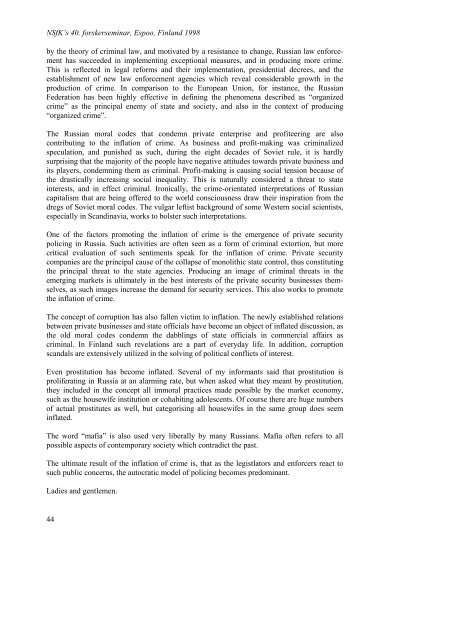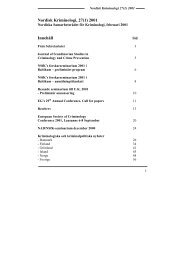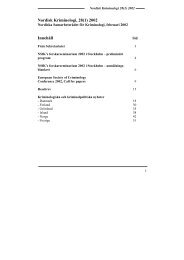Organised Crime & Crime Prevention - what works? - Scandinavian ...
Organised Crime & Crime Prevention - what works? - Scandinavian ...
Organised Crime & Crime Prevention - what works? - Scandinavian ...
You also want an ePaper? Increase the reach of your titles
YUMPU automatically turns print PDFs into web optimized ePapers that Google loves.
NSfK’s 40. forskerseminar, Espoo, Finland 1998<br />
by the theory of criminal law, and motivated by a resistance to change, Russian law enforcement<br />
has succeeded in implementing exceptional measures, and in producing more crime.<br />
This is reflected in legal reforms and their implementation, presidential decrees, and the<br />
establishment of new law enforcement agencies which reveal considerable growth in the<br />
production of crime. In comparison to the European Union, for instance, the Russian<br />
Federation has been highly effective in defining the phenomena described as “organized<br />
crime” as the principal enemy of state and society, and also in the context of producing<br />
“organized crime”.<br />
The Russian moral codes that condemn private enterprise and profiteering are also<br />
contributing to the inflation of crime. As business and profit-making was criminalized<br />
speculation, and punished as such, during the eight decades of Soviet rule, it is hardly<br />
surprising that the majority of the people have negative attitudes towards private business and<br />
its players, condemning them as criminal. Profit-making is causing social tension because of<br />
the drastically increasing social inequality. This is naturally considered a threat to state<br />
interests, and in effect criminal. Ironically, the crime-orientated interpretations of Russian<br />
capitalism that are being offered to the world consciousness draw their inspiration from the<br />
dregs of Soviet moral codes. The vulgar leftist background of some Western social scientists,<br />
especially in Scandinavia, <strong>works</strong> to bolster such interpretations.<br />
One of the factors promoting the inflation of crime is the emergence of private security<br />
policing in Russia. Such activities are often seen as a form of criminal extortion, but more<br />
critical evaluation of such sentiments speak for the inflation of crime. Private security<br />
companies are the principal cause of the collapse of monolithic state control, thus constituting<br />
the principal threat to the state agencies. Producing an image of criminal threats in the<br />
emerging markets is ultimately in the best interests of the private security businesses themselves,<br />
as such images increase the demand for security services. This also <strong>works</strong> to promote<br />
the inflation of crime.<br />
The concept of corruption has also fallen victim to inflation. The newly established relations<br />
between private businesses and state officials have become an object of inflated discussion, as<br />
the old moral codes condemn the dabblings of state officials in commercial affairs as<br />
criminal. In Finland such revelations are a part of everyday life. In addition, corruption<br />
scandals are extensively utilized in the solving of political conflicts of interest.<br />
Even prostitution has become inflated. Several of my informants said that prostitution is<br />
proliferating in Russia at an alarming rate, but when asked <strong>what</strong> they meant by prostitution,<br />
they included in the concept all immoral practices made possible by the market economy,<br />
such as the housewife institution or cohabiting adolescents. Of course there are huge numbers<br />
of actual prostitutes as well, but categorising all housewifes in the same group does seem<br />
inflated.<br />
The word “mafia” is also used very liberally by many Russians. Mafia often refers to all<br />
possible aspects of contemporary society which contradict the past.<br />
The ultimate result of the inflation of crime is, that as the legistlators and enforcers react to<br />
such public concerns, the autocratic model of policing becomes predominant.<br />
Ladies and gentlemen.<br />
44















